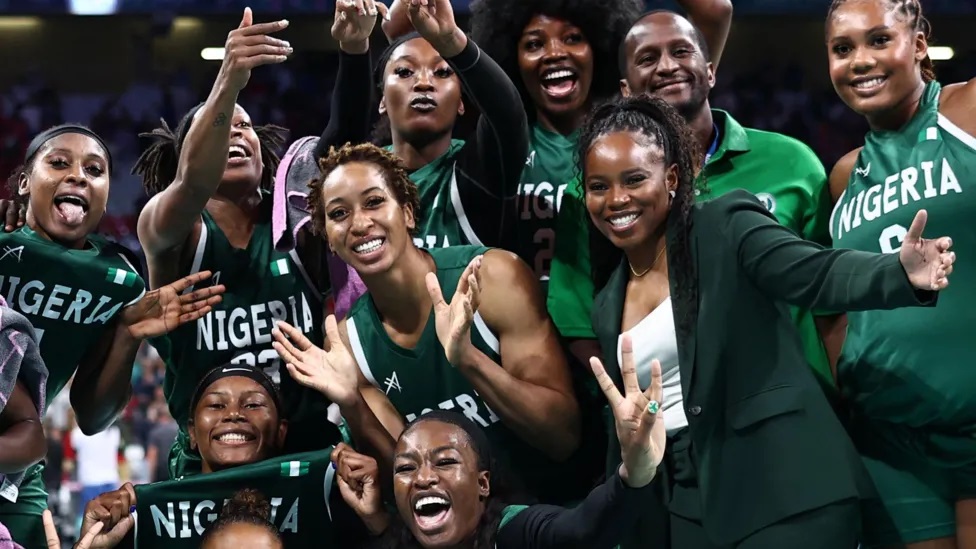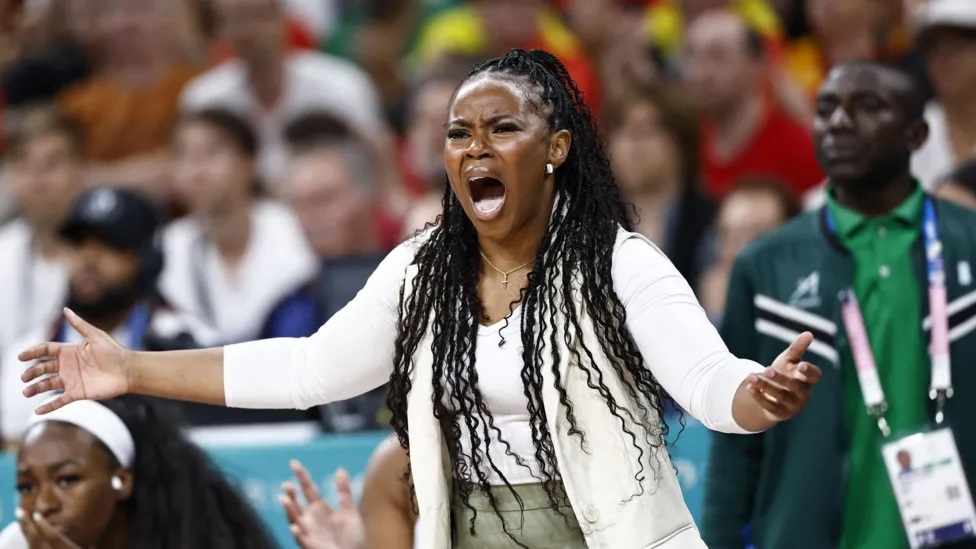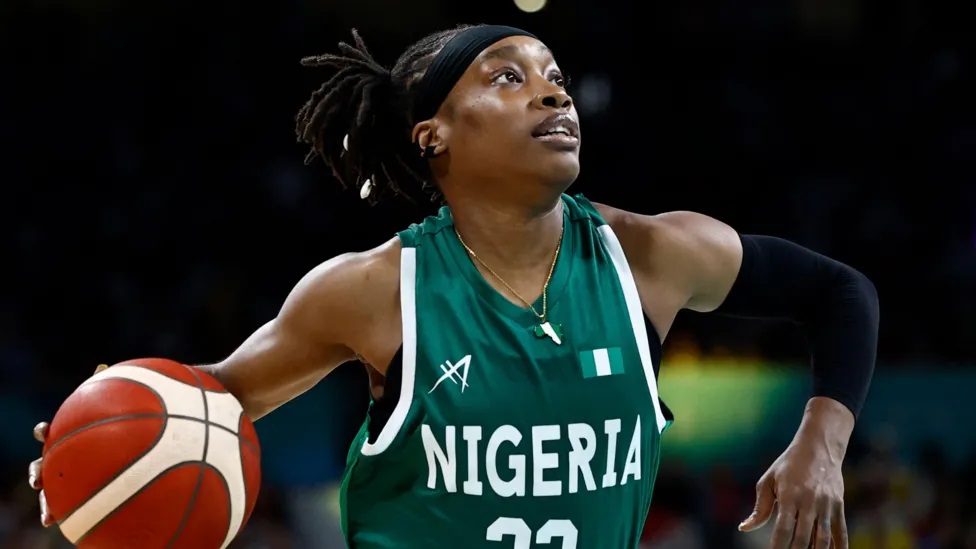
Nigeria’s historic run in the women’s basketball tournament at Paris 2024 has been underlined by defensive steel, as well as a sprinkling of inspiration from their young coach.
The team known as D’Tigress became the first African side – male or female – to reach the quarter-finals of an Olympic Games after beating Canada in their final group game on Sunday.
The West Africans registered a win on their Olympic debut in Athens in 2004 but had to wait 20 years for their second victory.
The challenge now is to build on their progress.
“I’m just hoping in the near future that it doesn’t take another 20 years to see the same success.”
However, the squad has had to show plenty of resilience off the court to get to this stage.
Striving amid struggles
Since the turn of the millennium Nigeria has emerged as the continent’s dominant side in the women’s game, but the West African nation has failed to translate that success onto the global stage.
Their appearance at Tokyo 2020 was overshadowed by disputes over bonus payments and allowances, while governance issues within the national federation cost the team a place at the Fiba World Cup in 2022.
However, their triumphant return to AfroBasket in 2023 set up their recent renaissance.
“This programme has been through a lot and we’re still striving and fighting,” said Lagos-born guard Elizabeth Balogun.
“We’re showing that no matter where you’re from, we can compete. It’s been a long road and we’re still going.”
Inadequate support and financial struggles nearly crippled the team, and even before travelling to Paris the side had to deal with another set-back, as captain Sarah Ogoke was forced to withdraw for personal reasons.
Power forward Nicole Enabosi believes their performances in France reflects the squad’s fighting spirit.
“This is our job and we have to take care of business,” she said.
“No matter what we had to go through, the adversity, we were still able to come out on top. It shows the magic behind basketball.”
The Wakama effect

The glue binding this team together is Rena Wakama, the 32-year-old whose journey with the team has been remarkable.
In just over a year in charge, as the first female head coach of D’Tigress, Wakama won AfroBasket last year and then secured qualification for the Olympics in February.
“I believe her resilience, her hunger to make a name and also prove a point to critics who didn’t feel she was good enough to take the job has [made] an impact,” basketball commentator and analyst Queen John-Moseph told BBC Sport Africa.
Udoka, who formerly served as an assistant coach with D’Tigress, says Wakama has done an “amazing” job.
“It’s great for her being so young and it just shows the bright future she has,” the former international added.
Wakama hopes her journey will inspire people across the continent to go after their dreams and, most importantly, help grow the women’s game.
“If we invest in Africa we’re capable of doing amazing things,” she said following their 79-70 victory over Canada.
“We have got to put some eyes on Africa and develop the game there. It starts with grass roots.”
A strong rearguard
African basketball is often set around the strategy of ‘Take care of your defence and the offence will take care of itself’.
Nigeria’s defensive game has certainly caught the eye – particularly their ability to pressurise opponents.
It was evident in their opening 75-62 win over Australia, who were forced into 26 turnovers, while D’Tigress lead the tournament in steals.
“It has been the strength of this Nigerian team,” John-Moseph said.
“It has really helped us. They gave Australia no space at all.”
Nigeria have used the aggressive nature of the African game to their advantage, with guard Balogun saying it is “a lifestyle” for the side.
“We wake up and do this every day,” the 23-year-old added.
“Nigeria is known for aggressiveness, trapping, running.”
Meanwhile, a 75-54 defeat in the second group game against hosts France provided food for thought for Wakama.
“It humbled us a lot and it made us dig deep and get back to what we did.”
Driven by Kalu

One figure who has showed up and showed out for Nigeria is point guard Ezinne Kalu.
The 32-year-old is averaging 19.3 points per game, and her haul of 21 points against Canada made her the first Nigerian player to score 20 or more points at the Olympics since Mfon Udoka, who managed that feat twice in 2004.
“Ezinne has been the heart and soul of the team,” Udoka said.
“She’s tough, feisty and strong, and has had a really great tournament. The rest of the team follows suit.”
Guard Promise Amukamara leads the team in assists, averaging 6.7 per game, while forward Murjanatu Musa has been crucial defensively with an average of 6.7 rebounds per game.
D’Tigress now face their toughest challenge yet.
The United States, the defending champions, stand in their way at the Bercy Arena on Wednesday (19:30 GMT).
Can Nigeria topple USA stars?
America’s women have won the past seven Olympic tournaments, are chasing their 10th gold overall and, with WNBA superstar A’ja Wilson and veterans Breanna Stewart and Jackie Young on their roster, Nigeria seemingly have their work cut out.
“We’ll definitely play them tough, but I don’t know how long that’s going to last because we don’t have a lot of depth,” Udoka admitted.
“The USA, whoever comes off their bench, they keep the same pace, the same momentum.”
The encounter is the second Olympic meeting between the two teams, after the US won their clash at the Tokyo Games three years ago, while D’Tigress also suffered a a 100-46 thrashing in February’s qualifying tournament.
“You have a lot of assassins on the US [team] to guard,” John-Moseph told Newsday on the BBC World Service.
“It’s going to be really tough but the girls have fought hard to come this far.
For Wakama, D’Tigress have already done much of the hard work over the last few years.
“[There is] no pressure now. We proved to everybody that we should be here.”
Source: BBC






